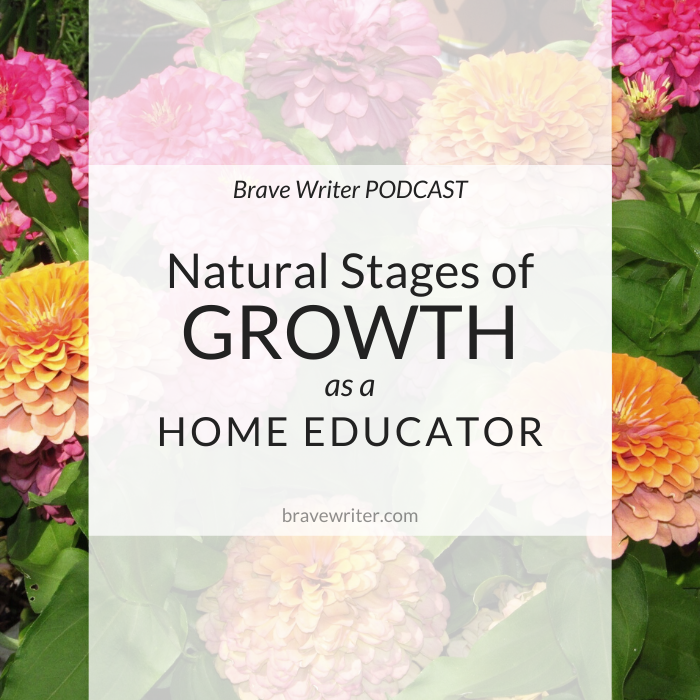Brave Writer Podcast: Natural Stages of Growth as a Home Educator

In Brave Writer we talk a lot about the natural stages of growth for young writers, which help parents place their children and figure reasonable expectations. Today we’re looking at the natural stages of development for homeschool instructors.
If you are a home educating parent, this is made for you – and if you are married to someone who is not a home educating parent, this may serve as a helpful guide for them. Even if your spouse is not on the exact same journey, it is valuable for them to understand the unique journey you’re undertaking.
Stage 1 – Jumping In!
Quite often, home educators jump into homeschooling without any formal training. We’re drawn to the notion of bonded family, participating in our children’s firsts, and the idea that we can provide something better or different than the school system… but we don’t necessarily know what the heck we’re doing!
At this point, the blossoming home educator is probably going to be quite enthusiastic about their new decision, and this is contrasted by little to no change in your children. Your children didn’t make a big decision to get excited about – they are just living their lives.
This stage may last anywhere from 6-12 months, no matter what ages your kids are.
Stage 2 – Playing School
Your excitement might have carried you over a number of obstacles during your first year, but eventually the reality of homeschool starts to set in – it’s hard.
Some things that you thought worked easily may not feel so easy this year, or you may feel more resistance from your children.
As a result, many home educators fall back on what they know; they create a miniature school, including a classroom setup, strict schedule, and familiar education curriculum.
Ultimately, though, you will stumble upon a homeschooling truth: school has different properties than home. School is about groups, instructors, schedules, curriculum, expectations, standards, and pressure. Home is where you get away from all that.
Our home schools have to suit the properties of home for them to feel natural.
Stage 3 – Following the “Method”
After we get exhausted with playing school, we start exploring philosophies of education that help us do a better job of being at home, while still providing a good education.
And there are quite a number of popular methods, including Classical, Unschooling, Eclectic, Charlotte Mason, and even Brave Writer.
There is nothing wrong, at all, with adopting a new methodology, especially for a season. Experience the method, allow yourself to be taught by it, and indulge fully if it appeals to you.
When you’re at this stage, as you start thinking about different educational models, you’re actually training your brain and educating yourself as a home educator.
Exploring these models, reading materials written by proponents of these methods, and asking new questions will inform your sense of confidence as a home educator – but there’s also a danger in ideological purity.
If you start to think that by following one method perfectly, you’ll be able to guarantee safe results, it’s easy to become judgemental of every other methodology, even shunning the people who use them and discounting their experiences.
But if you acknowledge that even sincere people can have different experiences using the same philosophy or methodology, you put yourself back in charge of the ship. And being in control can be a scary place for us to be because then, if something goes wrong, it’s no one’s fault but ours; we can’t blame the method.
Stage 4 – Swapping Curriculum
After investing in one method thoroughly, we’ll generally hit a wall. So what do we do? We swap curriculum!
And you know what? Sometimes this will work!
However, what works for one child may not work for another, so you can’t fall back into the same trap of believing you found “the answer” to home education. Conversely, you can’t swap too often, too fast.
Think of the variety of curricula as a sandbox for you to play in! Stop thinking it will save your life, and instead seek out the unique offering that each curriculum has for your family. You don’t have to use every aspect of every tool, but sometimes a new source of information can catalyze new insight or a useful change in perspective.
Stage 5 – Trusting Yourself
After you’ve been through all of those developmental stages, gained information, and experienced a lot of failure, you will finally be able to lay down a solid foundation for home education.
You are in charge of your home school experience, and you can trust yourself!
Stage 6 – The “Re-Upping” Moment
If you start homeschooling with your first child, then we guess you’ll reach stage five and start trusting yourself around junior high – and then highschool happens, and it’s like you have to start from scratch all over again!
The good news: you’ve already gone through all of these stages once, so it should be easier and faster than it was the first time.
Allow yourself to go back through these stages, but this time you will have more confidence, and you will have children who are more capable of offering feedback. So this is not just a re-upping moment for you as a home educator, but for everyone in the family – and your children’s point of view is paramount.
Stage 7 – Us-Schooling
When you’ve gone through those stages again, taking your children’s opinions into account to build a unique methodology around your family’s unique needs, you will have built an “Us School.”
Your homeschool won’t look like ours or anyone else’s – it’ll look like your family.
Stage 8 – The Veteran
(AKA “Phew! Finished”)
Once your kids are done, and it’s too late for you to fix or change anything, you are a veteran.
Your family will all be better people for going through the process. You will have grown through loss, pain, triumph, and achievement, and there will be a collection of human beings that go out and make their mark on the world.
And you will get to know that you were an essential, constituent part of that development – and that’s the gift of homeschooling.
Would you please post a review on Apple Podcasts for us?
Help a homeschooler like you find more joy in the journey. Thanks!

















